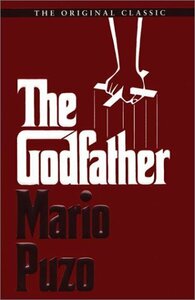Take a photo of a barcode or cover
This is a rare example of the movie being much better than the book. The characters aren't as interesting here and a lot of time is spent with gross plotlines I didn't care for. I still appreciate what Puzo set up here(for the movie) though, so it's not all bad.
dark
emotional
mysterious
sad
tense
medium-paced
Plot or Character Driven:
Plot
Strong character development:
Yes
Loveable characters:
Complicated
Diverse cast of characters:
No
Flaws of characters a main focus:
Yes
adventurous
dark
mysterious
tense
medium-paced
Plot or Character Driven:
A mix
Strong character development:
Yes
Loveable characters:
Complicated
Diverse cast of characters:
Yes
Flaws of characters a main focus:
Yes
i’ve tried to get through it more times than i can count. at this point, i have to admit that...


dark
tense
medium-paced
Plot or Character Driven:
A mix
Strong character development:
Complicated
Diverse cast of characters:
No
Flaws of characters a main focus:
Complicated
Wow. What a perfectly crafted book. One needs an open mind to read such sexist, racist and biased language..but wow.
Not a book that would ever be published today, but one that truly encompasses the dynamics of one of the harshest groups of society.
Not a book that would ever be published today, but one that truly encompasses the dynamics of one of the harshest groups of society.
adventurous
dark
tense
medium-paced
adventurous
dark
emotional
mysterious
tense
medium-paced
Plot or Character Driven:
Character
Strong character development:
Yes
Loveable characters:
Complicated
Diverse cast of characters:
Complicated
Flaws of characters a main focus:
No
Loved it more than I thought I would. Surprisingly fantastic, despite hating the film. Tom Hagen and Michael Corleone ftw
dark
sad
tense
medium-paced
Plot or Character Driven:
A mix
Strong character development:
Yes
Loveable characters:
Complicated
Diverse cast of characters:
No
Flaws of characters a main focus:
Yes
This is a strange and compelling novel, part pulpy crime saga, part Shakespearean family tragedy. While its flaws are glaring and often hard to ignore, it’s not difficult to see why Francis Ford Coppola looked at these pages and saw the seeds of one of the greatest films of all time.
The most glaring issue for me as a reader was the rampant misogyny and sexism woven throughout the novel. I was never entirely sure if Puzo was reflecting his own values or attempting to capture the harsh realities of a criminal organization that was both fiercely patriarchal and staunchly conservative (even by 1940s standards). Either way, the result is alienating. Women are either mothers or whores, with very little nuance in between. Connie Corleone’s pleas for help against her abusive husband are dismissed by her father (the so-called devoted family man) who casually accepts spousal violence as permissible. Kay, perhaps the most interesting woman in the novel, functions mostly as an audience insert, only to devolve into a simpering housewife by the end.
There’s also a surprising fixation on genitalia (especially Sonny’s), which felt unnecessary and distracting. And while Coppola’s film wisely pruned away whole sections, most notably Johnny Fontaine’s interminable subplot, the novel often meanders, giving excessive page time to secondary characters who don’t ultimately enrich the core story. Fontaine in particular is insufferable, a dull, misogynistic character whose chapters add little beyond frustration.
That being said, Puzo’s talent as a storyteller is undeniable. His narrative voice is sharp, and when the book zeroes in on the Corleone family drama, it’s mesmerizing. The shifting perspectives give the sense of a sprawling criminal world, though at the cost of narrative focus. Michael could be considered the “main character,” but his minimal presence for much of the book makes that designation questionable. Still, by the end, his arc contains the seeds of tragedy that Coppola would elevate so brilliantly.
Some characters are drawn with chilling effectiveness: Tom Hagen embodies the Don’s credo of respect across class and status, while Luca Brasi is depicted as pure evil, far darker than his film counterpart, with crimes so grotesque that his inevitable death feels like justice served.
Puzo himself described the novel as pulp, and in many ways it is, lurid, violent, sensational. But underneath the excess lies a family saga of astounding dramatic weight, almost Shakespearean in its themes of loyalty, betrayal, and power.
Ultimately, "The Godfather" is a flawed but fascinating work. It suffers from dated gender politics, uneven pacing, and gratuitous detail, yet it also reveals Puzo’s gift for spinning a gripping, tragic story. If Coppola’s adaptation is the lean, focused masterpiece, the novel is the messy, overstuffed blueprint—worth reading, but not without caveats.
Graphic: Death, Gun violence, Misogyny, Sexism, Violence, Murder
Moderate: Domestic abuse, Racism, Sexual content
Minor: Child death, Homophobia, Pedophilia, Racial slurs, Abortion





